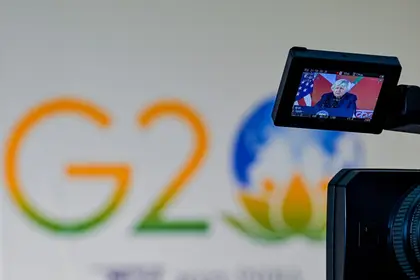Top US diplomat Antony Blinken was due in New Delhi on Wednesday, March 1, alongside Russia's Sergei Lavrov for a G20 meeting, with Ukraine and tensions with China set to overshadow attempts by host India to forge unity among the world's top economies.
JOIN US ON TELEGRAM
Follow our coverage of the war on the @Kyivpost_official.
A meeting was seen as unlikely between the two men, who have not been in the same room since a G20 meeting in Bali in July when, according to Western officials, the Russian foreign minister walked out.
They last met individually in January 2022, weeks before Russia invaded Ukraine. The two men have spoken by phone since but about other issues and not the war.
Lavrov arrived late Tuesday in India -- which has not condemned the war -- and will use his G20 attendance to lay into the West, according to the Russian foreign ministry.
Western countries want to "take revenge for the inevitable disappearance of the levers of dominance from its hands," the ministry's English-language statement said.
"The destructive policy of the US and its allies has already put the world on the brink of a disaster, provoked a rollback in socio-economic development and seriously aggravated the situation of the poorest countries," it added.
- 'Spy balloon' -
Similarly in doubt on the sidelines of the two-day G20 gathering in New Delhi was a meeting between Blinken and his Chinese counterpart Qin Gang.
Blinken had a fiery encounter with top Chinese diplomat Wang Yi last month in Germany after the US shot down a suspected Chinese spy balloon over its east coast on February 4.

Zelensky Meets CIA Director William Burns in Ukraine
The incident led Blinken to nix a rare trip to China, slamming the "unacceptable violation of US sovereignty and international law" which "must never again occur," the State Department said.
Beijing, which has also been angered by Washington's stance on Taiwan, denies it uses spy balloons and says the craft was for weather research.
Wang "urged the US side to change course, acknowledge and repair the damage that its excessive use of force caused to China-US relations," state news agency Xinhua reported.
- 'Material support' -
Blinken also warned Wang against providing "material support" to Russia's faltering war effort, as is speculated in Washington. Beijing denies any such intention.
State news agency Xinhua quoted Wang last week as saying China was willing to "strengthen strategic coordination" with Russia after meeting Lavrov and President Vladimir Putin in Moscow.
Blinken was also expected to meet on Friday his counterparts from the Quad group -- Japan, Australia and India -- that is seen as a bulwark against China in the Asia-Pacific region.
- Awkward hosts -
The Group of Twenty comprises 19 countries and the European Union, representing around 85 percent of the world's economy and two-thirds of its population.
India wants its G20 presidency this year to focus on issues like alleviating poverty and climate finance, but the Ukraine war and its effects are set to dominate the agenda.
Last week a meeting of G20 finance ministers in Bengaluru failed to agree on a common statement after Russia and China sought to water down language on the Ukraine war.
Hosting the G20 puts India in a tricky position, because while it shares Western concerns about China it is also a major buyer of Russian arms and has ramped up oil imports.
India has not condemned the invasion, although Prime Minister Narendra Modi told Putin last year that this was "not a time for war" in comments seen as a rebuke to Moscow.
German Chancellor Olaf Scholz said Saturday on a visit to India that he did not believe that Modi's government "is under any illusions that this is an offensive war started by Russia in order to acquire a part of its neighbor's territory."
You can also highlight the text and press Ctrl + Enter






